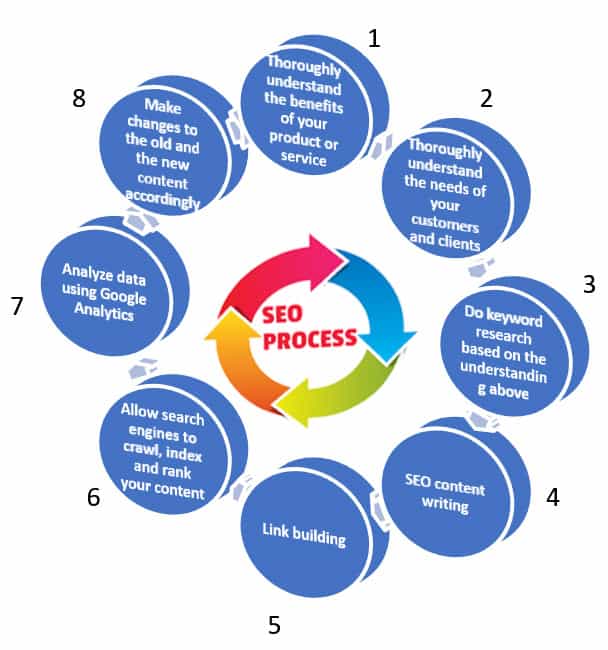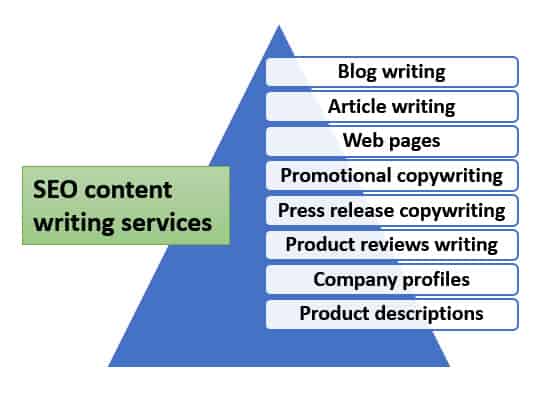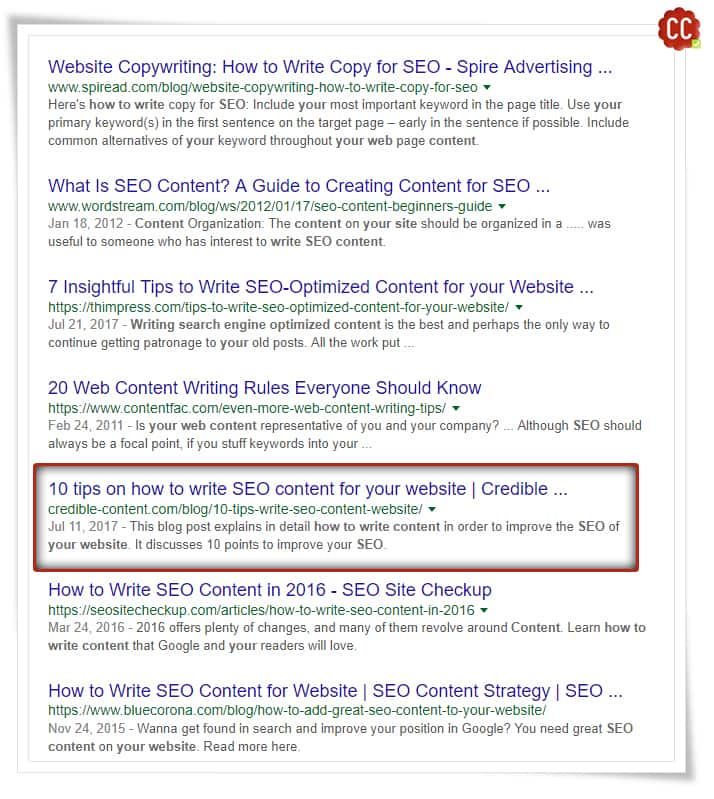 Do you know that being a small business SEO content writing can easily be the strongest tool available to you? Some tips listed on this blog post can help you to great extent. Remember that these tips are not written in stone and every business may have its own unique requirements. But they can get you started in the right direction.
Do you know that being a small business SEO content writing can easily be the strongest tool available to you? Some tips listed on this blog post can help you to great extent. Remember that these tips are not written in stone and every business may have its own unique requirements. But they can get you started in the right direction.
Content writing for SEO can cut down your advertising and marketing costs. It can significantly improve your search engine rankings. It can increase your business without increasing your costs. It can make people trust you more.
What is the difference between SEO content writing and normal content writing?
In terms of creating high-quality content for your website or blog, there isn’t much difference as far as the list of tips goes. Well-written, relevant content is automatically search engine optimized. Search engines like Google love quality content that solves people’s problems. Just the fact that you are publishing lots of content that solves people’s problems, can significantly improve your search engine rankings.
Other than that, the fundamental difference between SEO content writing and normal content writing is, you take search engine guidelines into account when creating search engine optimized content so that it becomes easier for search engine crawlers and ranking algorithms to access your content, process it, and then rank it for related keywords and search terms.
You can write high quality content without caring about search engine guidelines. Although your content will be good and once people can access your content and your content may even be able to convert visitors into buyers and customers, you won’t be able to get good search engine traffic, especially if there is lots of competition.
So, normal content is good content, and SEO content is content that is good but is also search engine optimized.
Why SEO content can work wonders for your small business?
As a serious small-business you might be spending lots of money on advertising. If you seek traffic from search engines you must be bidding on different keywords using AdWords. This can be very expensive for your small business.
In AdWords, you may have to pay $2-3 per click for your main keywords. And the problem sometimes is, your main keywords may not even get you much business compared to your secondary or longtail keywords. Still, you spend money on non-performing keywords simply because you want to see traffic to your website.
Looking for an SEO content writing for small business?

SEO content writing can increase search engine rankings of your small business website organically. Once your search engine rankings improve organically by diligently following these tips, you start getting traffic from search engines without having to pay for every click. Once you have gotten one of your links featured in the top 10 results on Google, whether you get 10 clicks or 10,000 clicks, it’s all free.
The good thing about organic search results is that people prefer to click organic results rather than advertisements. So even in terms of getting more traffic from search engines, organic listings are much better than paid listings.
But how do you make sure that your small business website or blog gets good search engine rankings through your writing?
Listed below are 10 SEO content writing tips for your small business that will increase your search engine rankings, and also improve your conversion rate.
1. Do keyword research before writing content
What keywords do people use to find your website or your content? What search terms do they use? This is one of the most important tips.
You can make a list of keywords and search terms using common sense and little bit of research. You can also use paid and free tools to do keyword research.
One of the most widely used free keyword research tools is the Google AdWords keyword research tool. Although most of its suggestions are intended to encourage you to bid on as many keywords as possible and hence, the suggestions are not as accurate as they should be, it gives you a good beginning, and lots of ideas.
Even if you don’t want to use any tool, do a broad search and then scroll down to suggested searches on Google. This tells you what search terms people are using that are related to your main search term.
2. Start writing SEO content around the keywords you have finalized
Remember that the most important aspect that Google considers for ranking is the quality of your content. No amount of SEO content writing is going to help you if you don’t have quality content on your website. If it is difficult for you to create compelling content using your keywords, in the beginning, just focus on the quality aspect.
Just make sure that the keywords or search term you are targeting appear, most preferably, in the beginning of your web page or blog title. After that, let your creative juices flow.
Once you are satisfied and you feel you have written whatever you wanted to write, start incorporating your keywords. Ideally, if you’re focusing on the core topic, most probably you will automatically end up using your keywords. If not, you will have to creatively incorporate them. Don’t overdo it. Your total number of words to your keywords ratio should be around 3-4%. Overuse of your keywords can get you penalized.
If you use WordPress for managing your website and blog, there is a good add-on called SEOPressor. It gives your content an “SEO rating” and if you are over optimizing – over using your keywords – it lets you know.
Having said that, it doesn’t actually matter how many times you use your keywords as long as you contextually use them. Just don’t overuse them.
3. Create a compelling title for your web page or blog post
Remember that it’s your web page title or blog post title that initially draws people to your website or blog. In the search engine listings, it is your title that appears as hyperlink. In fact, one of the biggest reasons why you should use your keywords in your title is because when people see the keywords they have just used in the title, they tend to click the link more. Even when you share your link using your social networking profiles, it’s your title that appears as the main hyperlink. People will come to your website after you title grabs their attention. Consequently, coming up with keyword-rich compelling titles is a big part of effective SEO content writing.
4. Also focus on longtail keywords
When writing SEO content, don’t ignore your longtail keywords. In fact, you should create dedicated webpages and blog posts dealing with your prominent longtail keywords. But even on your present piece of content, use a mix of your primary keyword and longtail keywords. This will prevent you from over using your main keywords.
It is also recommended that you use LSI keywords. LSI stands for “latent semantic indexing”. In terms of SEO content writing, it means using alternatives to your main keywords. You can use synonyms. You can use alternative expressions.
Read How does incorporating keywords increase your search engine traffic.
5. Mostly focus on providing answers to questions
 When using search engines, people don’t use specific keywords. They normally type questions (or say, if they use voice search). So, provide answers to these questions. Make a list of all possible questions your prospective customers and clients may ask before doing business with you and then publish all the answers using questions as titles.
When using search engines, people don’t use specific keywords. They normally type questions (or say, if they use voice search). So, provide answers to these questions. Make a list of all possible questions your prospective customers and clients may ask before doing business with you and then publish all the answers using questions as titles.
6. Use conversational style in your SEO writing
 People don’t use novelish language while surfing the web. They use very common, conversational words. A good example: when people are searching for “bananas” they don’t search for “an elongated yellow fruit”.
People don’t use novelish language while surfing the web. They use very common, conversational words. A good example: when people are searching for “bananas” they don’t search for “an elongated yellow fruit”.
Even when they are searching, they use very common words pertaining to your business. You should also avoid using jargon because whereas jargon may make you look cool, it may lose you customers.
You can use a tool like Hemingway Editor to grade your writing. It says that content writing with grade 6-8 is better and gets you good search engine rankings. “Grade” here means, writing with grade 6 can be easily read by a 6th grader.
7. Use a well-defined structure
Use a well-defined structure means using headlines and sub-headlines wherever needed. Organize your thoughts in bullet points. Use quotes wherever necessary. Write simpler sentences and smaller paragraphs. Link to inner pages with appropriate anchor text. Use bold type a few times to highlight your main expressions. Stick to a particular length.
8. Use images to graphically convey your feelings
Long streams of text seem to bore people no matter how informative your text is. Insert images at crucial points. They act as a welcome distraction. They also help people refocus. Don’t use totally unrelated images. If you are comfortable using an image editing tool, create a mix of graphics and text.
9. Focus on something unique when writing SEO content
The more generic your content is, the harder is the competition it faces. Narrow down your targeting as much as possible. Search engine optimization for the search term that isn’t being used by many is much easier.
Also, focusing on something unique will help you avoid writing duplicate content which can attract penalty from Google.
Even if it is not possible to offer something totally unique, address a very unique perspective of your product or service and write about that.
10. Keep optimizing your existing content
SEO content writing doesn’t just mean continuously publishing fresh content. You also need to take care of your existing content. Over the years your website or blog must have collected a ton of content. If this content remains unattended, all that effort goes waste.
Make a list of all the URLs that contain marketable content on your website. Check their search engine rankings for the targeted keywords. If over the weeks, months and years their rankings haven’t improved, start rewriting the content from SEO perspective.
Maybe you used some bad practices like needlessly using your keywords and search terms, and you would like to remove them. Maybe over optimized your content in enthusiasm. Maybe you created thin content.
It is a time-consuming activity, but go through every link, check its rankings, and if it doesn’t rank well, rewrite it.
Concluding remarks
I personally know a client who has cut down his advertising budget by 70% ever since he started relying more on SEO content and less on advertisements.
A good thing about SEO content is that sometimes the same web page begins to get ranked higher for multiple keywords or keyword combinations. If you use AdWords, you have to pay for every combination, but not for a link that ranks higher organically.
Yes, more effort is required. Content writing for SEO take some time to show results, especially when you have lots of competition. But the rewards are great. You get more targeted traffic. Your marketing cost comes down significantly. Your conversion rate improves. Your brand value improves because people begin to find quality content on your website.
Want to know how you can improve your search engine rankings as well as conversion rate of your small business website through targeted SEO content writing?





